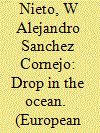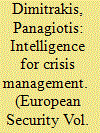| Srl | Item |
| 1 |
ID:
085568


|
|
|
|
|
| Publication |
2008.
|
| Summary/Abstract |
This article discusses Bulgaria's NATO membership; the discussion centers on how Black Sea geopolitics have been altered due to NATO's increasing presence in the area. Furthermore, I discuss in what ways Bulgaria contributes to the NATO alliance by being a member. Finally, the article discusses the effects of the summer 2008 events in Georgia vis-a-vis Black Sea geopolitics. The geographical position and the events occurring around this Southeastern European country have made Bulgaria a strategically important country for the security future of the region
|
|
|
|
|
|
|
|
|
|
|
|
|
|
|
|
| 2 |
ID:
085561


|
|
|
|
|
| Publication |
2008.
|
| Summary/Abstract |
This article assesses the political and structural obstacles that have affected the development of a European Security and Defence Policy (ESDP). Furthermore, the article aims to identify and examine the measures that need to be introduced by the EU in order to accelerate the smoothness of ESDP's operability.
|
|
|
|
|
|
|
|
|
|
|
|
|
|
|
|
| 3 |
ID:
085565


|
|
|
|
|
| Publication |
2008.
|
| Summary/Abstract |
Until today the January 1996 Greek-Turkish crisis over the sovereignty status of two Southeast Aegean islets remains the pick point of Greek-Turkish antagonism. In this article, the author assesses the role of Greek military intelligence during the crisis. He argues that Hellenic intelligence did not anticipate a confrontation with Turkey over two uninhabited islets. Eventually, the MoD mobilised a disproportionate number of ships in the Aegean to defend Greek sovereignty over the Imia islets. As the crisis unfolded, the Greek prime minister became frustrated by the inability of Greek intelligence services to confirm a Turkish landing on the second Imia islet. The author shows that during the crisis hours of 31 January 1996, the lack of tactical intelligence on Turkish deployment had a direct impact on the assessment of the operational status of the Greek armed forces and on the planned crisis response. Ultimately, rather than causing an acute sense of vulnerability, fear, and an aggressive response, the lack of intelligence led to a de-escalation of the crisis.
|
|
|
|
|
|
|
|
|
|
|
|
|
|
|
|
| 4 |
ID:
085567


|
|
|
|
|
| Publication |
2008.
|
| Summary/Abstract |
This paper presents the results of the Global Corruption Barometer Survey 2006 and 2007 as they relate to the military, showing that globally the military is regarded as relatively corruption-free compared with other institutions such as political parties and parliaments. Only religious bodies and NGOs benefit from more favourable perceptions. The most positive perceptions of the military are found in Western Europe, while the least favourable are found in Africa, Latin America and Newly Independent States. The disaggregated results also reveal broad variation in perceptions by country, with some surprising scores thrown up. The analysis is enriched by context the local perspectives, provided by anti-corruption experts.
|
|
|
|
|
|
|
|
|
|
|
|
|
|
|
|
| 5 |
ID:
085563


|
|
|
|
|
| Publication |
2008.
|
| Summary/Abstract |
The United States and Russia can, and should, get on with the business of reducing their numbers of deployed strategic nuclear weapons. Missile defenses planned for deployment by the United States in Eastern Europe have provoked energetic Russian skepticism. But Russian and American interests lie in cooperation on missile defense, as well as on nonproliferation and offensive arms limitations.
|
|
|
|
|
|
|
|
|
|
|
|
|
|
|
|